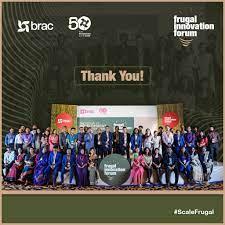
Reading Time: 3 minutes
https://blog.brac.net/3-key-insights-from-frugal-innovation-forum-2022/
Fallouts of the pandemic demanded a critical examination and reinvention of our approaches towards development. Against this backdrop, the calls of ‘doing development differently’ rang louder than ever but what’s to be done and more importantly how it ought to be done were the burning questions.
It was these questions which took the centre stage at the seventh edition of Frugal Innovation Forum in October. Hosted by BRAC, the forum brought together 230 development practitioners, thinkers, researchers, innovators and policymakers from across the global south under one roof in Dhaka to answer one question which was – What’s the future of development in the post-pandemic world?
It was three days of insightful discussions and experience sharing. Plenary sessions were held on topics ranging from social inclusion to climate change. The forum also featured workshops and field visits to facilitate the understanding of the intertwined nature of the process of social change. Here are three key insights from the festival of social innovation.
Partnerships and adaptability key in times of crises
Guess one of the most difficult challenges of any multi-stakeholder initiative.
Efficient collaboration.
Ironically, in times of crisis, efficient collaboration is usually not in short supply. During these trying times, collaboration usually comes hand in hand with a showdown of the unending human potential to adapt. Case in point is the so-called ‘WhatsApp governance’ where during the early days of the pandemic, majority of the high-level government decisions in Bangladesh were taken swiftly with the help of a couple of WhatAapp texts. It’s something to take inspiration from, if such acts of absolute collaboration can be shown amidst the chaos of the crises, there’s surely room to replicate it when times are not so tough.
One example of an efficient partnership which emerged was the biggest telecom service provider in Bangladesh, Grameenphone, joining hands with Dr Tasnim Jara, founder of Shohay Health (a platform for medical information), to provide health information during the peak of the pandemic as health misinformation, which was rampant those days, could give a false sense of security and can potentially be fatal. Stories of a number of other partnerships, some of which were between various government entities and the private sector to combat the pandemic, also showed the way forward.
Climate action can’t wait
According to an IPCC Climate Risk report, between now and 2050, there will be a 2.5 billion rise in the number of urban dwellers worldwide, with 90% of that expansion taking place in the global south. Climate vulnerability among the urban dwellers is also set to increase proportionately on top of its disastrous effects in remote coastal and drought prone regions globally.
Climate change isn’t waiting for anyone. That’s exactly why climate action also can’t wait. It has become imperative to dawn the climate lens while approaching any development initiatives. Also, it must be kept in mind that climate adaptation efforts need to be locally-led and climate funding must get to the ground, to the people who need it the most.
Frugal healthcare innovations work
If there’s any specific sector that has the opportunity to completely overhaul itself based on the learnings from the pandemic, it’s the healthcare sector. Globally, it has experienced a plethora of hiccups during the course of the pandemic starting from the failure in early detection of COVID-19 to unavailability of personal protective equipment for the frontline workers.
In his ‘Impact Talk’, Professor Dr Ahmed Mushfiq Mobarak of Yale University shared his insights for delivering healthcare to the last mile through his findings from a randomised-control trial which was conducted in Sierra Leone. It was found that frugal and decentralised healthcare innovations are still the most effective in taking healthcare to the remotest corners of the world.
While reflecting on the past three years, we must acknowledge that the pandemic presented us with opportunities to reimagine the future of work, healthcare, climate change and many more. It has been made clear how deeply connected the world is – that functioning within the silos of our individual fields, sectors, communities and disregarding our interconnectedness can lead to the collapse of systems. At Frugal Innovation Forum 2022 we sought to challenge that very notion and reexamine the fundamental pillars of development. To learn more about the forum and the insights shared, visit: https://innovation.brac.net/fif2022/
Farah Masud is Innovation Associate at Social Innovation Lab, BRAC.
Khondokar Anwar Shadat is Manager, Frontier Technologies at Social Innovation Lab, BRAC.
Erina Mahmud is Knowledge Management Consultant at Social Innovation Lab, BRAC.










Add new comment